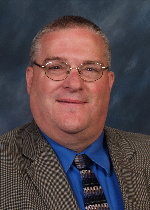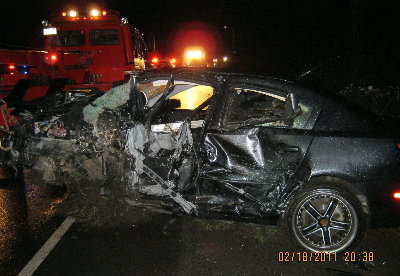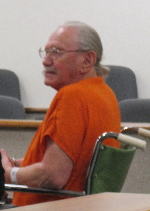By Sharyn L. Decker
Lewis County Sirens news reporter
CHEHALIS – Among the first official actions after being elected Lewis County coroner was Warren McLeod’s announcement last month he would hold a coroner’s inquest into the controversial 1998 death in Toledo of former state trooper Ronda Reynolds.

Lewis County Coroner Warren McLeod
But details such as what questions a citizen panel will be expected to answer and even what rules will guide the inquiry are not yet settled.
Coroner’s inquests in Washington state are rare; so infrequent, it’s difficult to find someone to pinpoint the guidelines under which they are held.
“Rules? That’s what I was asking, there are no set rules set by state standard,” McLeod said yesterday.
The 51-year-old who moved to Chehalis from Las Vegas two years ago to take a job as a community college forensics instructor has asked an outside coroner to preside over the inquest.
McLeod said he’s still “in the learning process” in a job that was held for almost three decades by physician’s assistant Terry Wilson.
Greg Sandstrom, president of the Washington Association of Coroners and Medical Examiners and an elected coroner himself for 12 years, says inquests here are not real common, but there are guidelines.

Ronda Reynolds
“The rules for it are drawn out in state law,” Sandstrom said pointing to the Revised Code of Washington.
“The coroner can issue subpoenas, the jury is six people,” he said. “The coroner is responsible for orchestrating the whole thing with the help of the prosecutor’s office.”
And Dan Blasdel, an elected coroner from Eastern Washington McLeod appointed to conduct the inquest in Reynolds’ death, says he uses protocols for coroner’s inquests held in Canada.
Blasdel is a past president of the state association and currently co-chair of its education committee.
“The association, we use the guidelines for inquests out of Canada,” Blasdel said. “Because it’s not a criminal trial. All it is is a fact finding tool.”
McLeod, and his challenger in the November election, both vowed to change the manner of death from suicide to undetermined in the Reynolds’ case that has been questioned vigorously for a dozen years by Reynolds’ mother, Spokane resident Barb Thompson.
The 33-year-old woman was found with a bullet in her head and covered by a turned-on electric blanket on the floor of a closet in the home she shared with her husband of less than a year, Ron Reynolds.
The case was closed by the Lewis County Sheriff’s Office as suicide despite protests by the lead detective, within a week after the attorney for Ron Reynolds threatened to file a lawsuit if they didn’t cease the investigation.
Coroner Wilson changed his determination three times over the years as the sheriff’s office case was reopened and then closed again.
Thompson won an unprecedented judicial review of the coroner’s decision, after which a judge ordered Wilson to remove the suicide designation.
The highly publicized civil proceedings in November 2009 in Lewis County Superior Court cast suspicions on Ron Reynolds, a Toledo Elementary School principal, as having a hand in the death. They also became the framework for best-selling author Ann Rule’s book on Ronda Reynolds released last autumn.
Wilson didn’t change the manner of death before leaving office in December. His appeal of the order is still making its way through the courts.
In his first days in office, McLeod changed the manner of Reynolds’ death to undetermined.
When he announced the inquest a month ago, McLeod said it was time for a final resolution.
Realizing he had only two choices, review it himself or conduct the review in a public forum – a corner’s inquest – he chose the latter, to enhance public confidence in the final conclusion, he said.
“The purpose of the inquest is to bring the information out into the public,” McLeod said.
The reason for appointing Blasdel, to whom he granted all the powers and privileges of his office to preside over the inquest, was similar, according to McLeod.
“Some may view the coroners office has a vested interest in the way this comes out,” he said. “I wanted to remove that perception, I wanted to make it open and above board, the perception.”
Before making his decision public, McLeod made courtesy calls to the sheriff, former Sheriff John McCroskey and to Ron Reynolds, he said.
“I’ve talked to him before, when I changed the manner of death,” he said of Reynolds. “He is her next-of-kin. It was a short conversation, he didn’t have a lot to say.”
Lewis County has never held a coroner’s inquest before, as far as he knows, according to newly elected Prosecutor Jonathan Meyer.
Blasdel, the elected Franklin County coroner since 1994, said he has conducted more coroner’s inquests than anyone in Washington.
He’s done two.
His is the only coroner’s office in the state accredited by the International Association of Coroners and Medical Examiners, according to Blasdel. The 55-year-old Pasco resident was president of the international association in 2006.
Blasdel has set a tentative date for Aug. 29 and expects the inquest to be no more than four days long.
“I will act as presiding judge over the inquest, to make sure the rules are followed,” he said.
The prosecutor – Lewis County Deputy Civil Prosecutor David Fine – will present the case to the jurors, he said.
There are no other attorneys, there is no cross examination, he said. Jurors cans submit questions, as can parties “with standing”, he said.
The decision of the jurors must be unanimous and they have five questions to answer, according to Blasdel. They are: the name of the deceased, date and time of death, place of death, cause of death and manner of death.
The inquest jury’s determinations are not binding, but McLeod has said he will abide by them.
Blasdel said he and Deputy Prosecutor Fine decided it was best to go outside Lewis County to get six unbiased citizens. They plan to hold the inquest in Clark County.
“Because I don’t think with all the publicity and press and everything in your county, I don’t think we could find anybody that hasn’t heard, read or has an opinion,” Blasdel said yesterday.
McLeod doesn’t know yet if he will attend.
The cost is estimated between $35,000 and $50,000, according to Blasdel and McLeod. It will come out of Lewis County’s budget.
Blasdel said in his 16 years in office, he only knows of a few coroner’s inquests held in the state; the two he handled in Franklin County, and two, maybe three or four, done by the Benton County coroner before he retired.
Some jurisdictions, such as King County, routinely hold inquests into law enforcement officer-related deaths, according to Blasdel and Sandstrom. However, those are not coroner’s inquests as they did away with the coroner system in King County in the late 1960s, according to a representative from the King County Medical Examiner’s Office.
Canadians do it on a regular basis, according to Blasdel.
When asked, Blasdel said yesterday the proceedings do not include asking the jurors the question of who is responsible, if they decide it is a homicide.
“They’re not disposed to say who they think did it,” he said.
However, in a separate interview, McLeod said he understands state law says the jury’s verdict must include that, if it is known. And although he is not presiding, he expects that question will be asked.
“I’m going to have to sit down with (David) Fine and if that’s one of the questions he wants to ask, we’ll ask it,” Blasdel said later yesterday.
The two men haven’t yet met to work out the details, he said. That will happen next month, he said.
Fine is out of the office this week and wasn’t available for an interview.
Lewis County Prosecutor Meyer said yesterday questions about the scope of the information which will be presented and other details are better directed to Fine than himself.
“But most likely everything that’s relevant to making a determination, whether good, bad or indifferent, from both sides,” Meyer said.
Meyer said he will be at the inquest, observing.
He has to be prepared for any actions or decisions that might be required by his office following the inquest, he said.
If someone is named as causing the death, he would have to decide what to do, he said. One of the RCWs states the coroner shall issue a warrant if the person committing the homicide is ascertained by the inquisition.
“It doesn’t necessarily mean a case starts, but I have to be prepared,” Meyer said.
The intricacies of the coroner’s inquest are up to Blasdel, he said.
Ron Reynolds didn’t return phone calls seeking his reaction to the coroners decision to hold an inquest.
Thompson, who’s almost always willing to discuss the case, is cautiously optimistic.
“Well, it could be a good thing or a bad thing,” she said this week. “If they do it right, I think it could be a good thing; if they actually go through all the evidence.”
The 63-year-old horse breeder found it somewhat concerning that Deputy Prosecutor Fine will be the one attorney responsible for the proceedings.
“He was fighting before in court against changing the death certificate and then he’s going to be unbiased in presenting evidence to a six-person jury in an inquest?” Thompson said. “I don’t know. He’s a sharp man. He’s capable of it, if he can play both sides.”
Her lawyer, Royce Ferguson, who has worked with her since her civil case was filed in August 2006, was more blunt about the choice of the civil attorney who will work with Blasdel. He called it a “head scratcher.”
“If McLeod wants it to look fair and impartial, that was 180 degrees the other way,” he said.
Thompson was surprised to learn of the coroner’s inquest not from McLeod, but in a phone call from the television show 48 Hours.
She said she sent the new coroner an email telling him it would have been better for him to let her know of his plans.
“That’s not his duty, but it was my understanding how he planned to treat families, keeping families in the loop,” she said.
McLeod this week said he notified Thompson through his attorney, and if not for the ongoing lawsuit, he would sit down with her anytime.
“I didn’t want her to think I’d become cold-hearted, but because of the way the situation is, we can’t have a one on one conversation without an attorney present,” he said.
The civil case that resulted in the 2009 judicial review is in the appeals court, currently on hold. It initially named Coroner Wilson, but even with Coroner McLeod now in the office it remains active.
Although the suicide label has been removed, and it won’t change Thompson’s situation, she and her attorney want the courts to define what should happen following a judicial review of a coroner’s determination, according to Thompson.
The particular law doesn’t lay that out.
Thompson wants a judge or the panel of jurors to have the authority to label a death a homicide.
Olympia attorney John Justice, who was hired by the Lewis County Prosecutors Office to represent Wilson, has asked the court of appeals to find the trial court made some mistakes in how it admitted evidence in the Nov. 2009 review, among other issues.
McLeod said yesterday he wasn’t aware Deputy Prosecutor Fine worked with Justice opposing Thompson in the civil case.




 Join us
Join us